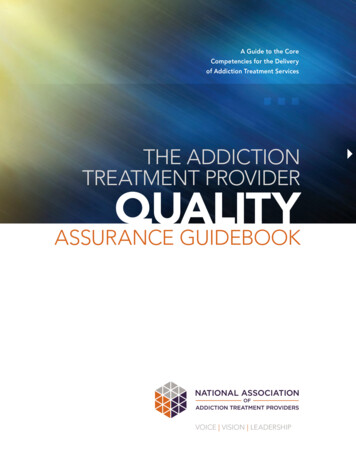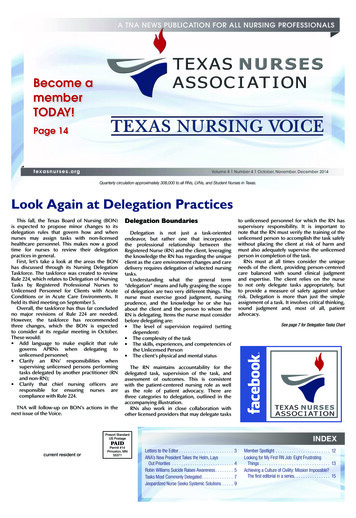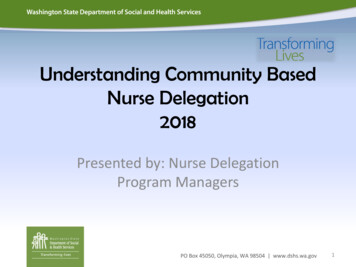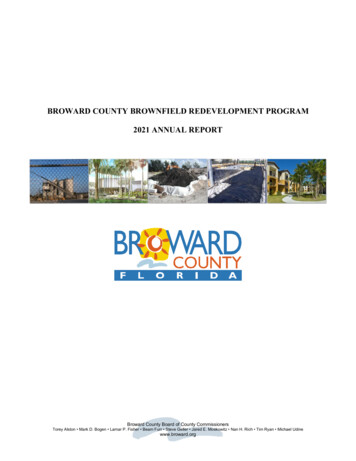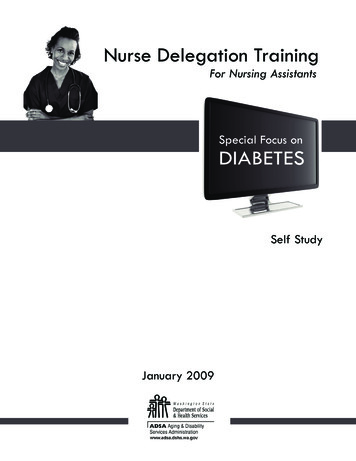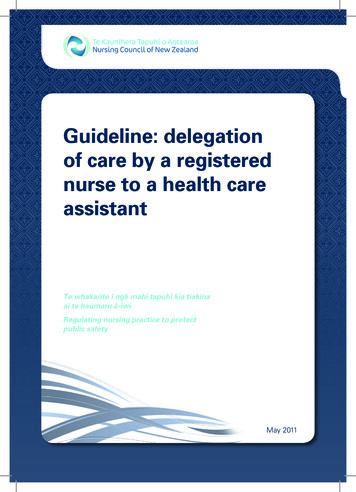
Transcription
Guideline: delegationof care by a registerednurse to a health careassistantTe whakarite i ngā mahi tapuhi kia tiakinaai te haumaru ā-iwiRegulating nursing practice to protectpublic safetyMay 2011
2 Delegation of care by a registered nurse to a health care assistantNursing Council of New ZealandPO Box 9644, Wellington 6011www.nursingcouncil.org.nzApproved by Council May 2011Published May 2012Amended September 2016 Nursing Council of New Zealand 2012ISBN 978-0-908662-41-8
3ContentsPageIntroduction4Understanding accountability5Understanding delegation5The principles of delegation5The responsibilities of the registered nurse6Five rights of delegation8Decision making process for delegation by a registered nurse9The responsibilities of the person carrying out the delegated activities10The responsibilities of the employer10Circumstances influencing the safe delegation of care11Situations where responsibility for delegation is not clear11Glossary13References16Appendix17
4 Delegation of care by a registered nurse to a health care assistantIntroductionThe Nursing Council of New Zealand has the authority under the Health PractitionersCompetence Assurance Act 2003 (the Act) to set standards for nursing practice and provideguidance to nurses and employers. The purpose of this guideline is to assist nurses tomake decisions about the delegation of activities to health care assistants. This guidelinewill also assist employers of nurses to understand the accountability and responsibilitiesof nurses in relation to delegation.Changing demands within health care mean registered nurses are increasingly beingassisted by health care assistants and other workers. Health care assistants are notregulated and do not have standardised educational preparation. Their role is determinedby their employer and outlined in their job description. This guideline focuses on theactivities that health care assistants might be asked to undertake by a registered nursewho has determined that the activity forms part of a nursing care plan. The NursingCouncil is responsible for guiding registered nurses on how to safely direct, monitor andevaluate activities delegated to health care assistants.When delegating to health care assistants, registered nurses should also consider thatwhen nurses carry out care activities they take a comprehensive approach includingconsideration of the complex physical, social, mental and emotional needs of the healthconsumer, whereas a health care assistant may focus on the completion of the delegatedactivities.Registered nurses should understand the role of the health care assistant to ensure theyare not required to function beyond the limits of their education or knowledge and skills.Note: health care assistants may have a variety of job titles such as carer, care giver,care assistant or health care support worker. For the purposes of this guideline the termhealth care assistant is used.
Understanding accountability5Understanding accountabilityRegistered nurses hold positions of trust and responsibility within the community. Asregistered health practitioners, nurses are answerable for their decisions and actions.They are professionally accountable to the Nursing Council and accountable underlegislation for their actions. They must also answer to their employer and to healthconsumers, and must be able to justify their decisions. Registered nurses use theirprofessional knowledge, judgment and skills to make decisions in partnership withhealth consumers based on their best interests. Registered nurses are responsible forensuring the health care assistant has the knowledge and skills to undertake delegatedtasks. They should inform health consumers when they are delegating aspects ofnursing care to health care assistants.Health care assistants are also legally accountable for their actions and accountable totheir employer. They must therefore have the appropriate skills and knowledge toundertake activities, and be working within policy and the direction and delegation of aregistered nurse. They must be careful not to lead health consumers to believe they area nurse when undertaking aspects of nursing care.Understanding delegationDelegation is the transfer of responsibility for the performance of an activity from oneperson to another with the former retaining accountability for the outcome.Direction is the active process of guiding, monitoring and evaluating the nursingactivities performed by another. Direction is provided directly when the registered nurseis actually present, observes, works with and directs the person; direction is providedindirectly when the registered nurse works in the same facility or organisation as thesupervised person but does not constantly observe his/her activities. The registerednurse must be available for reasonable access, i.e. must be available at all times on thepremises or be contactable by telephone (in community settings).The principles of delegation1The decision to delegate is a professional judgment made by a registered nurse andshould take into account:(a)(b)(c)(d)the health status of the health consumerthe complexity of the delegated activitythe context of care, andthe level of knowledge, skill and experience of the health care assistant toperform the delegated activity.
6 Delegation of care by a registered nurse to a health care assistant2The decision to delegate must be consistent with the service provider’s policies.3The registered nurse must ensure the health care assistant who has been delegatedthe activity:(a)(b)(c)(d)4understands the delegated activityhas received clear directionknows who and under what circumstances they should ask for assistanceknows when and to whom they should report.The registered nurse is responsible for monitoring and evaluating the outcomes ofdelegated nursing care.The responsibilities of the registered nurseThe scope of practice of registered nurses can be found in Appendix 1.1Assessment and monitoring of the health status of the health consumer(a) The health consumer must have a plan of care developed by a registerednurse who has undertaken a comprehensive assessment.(b) The registered nurse must determine the level of skill and knowledgerequired to ensure the safety, comfort and security of the health consumerbefore delegating care. This must be based on an assessment of thehealth consumer including consideration of the complexity of the carerequired rather than the tasks to be performed.(c) The registered nurse must provide ongoing monitoring of the health statusof the health consumers for whom he/she is responsible. This must beplanned along with the necessary support and guidance that will beprovided to the health care assistant performing the delegated activity.(d) The registered nurse must be directly involved with the health consumerwhen the health consumer’s responses are less predictable or changing,and/or the health consumer needs frequent assessment, care planningand evaluation.
Responsibilities of the registered nurse27Providing direction(a) It is the registered nurse’s responsibility to provide direct or indirectguidance according to the nature of the delegated activities and the abilitiesof the health care assistant to whom the activity is delegated. He/shemust be available for timely advice regarding any nursing needs. If theregistered nurse, whose role it is to provide direction, is off the premisesand not contactable, another registered nurse must be contactable forsuch guidance.(b) Processes for seeking contact and support with the registered nurse mustbe clearly documented and communicated within the nursing setting.(c) An appropriately educated and experienced registered nurse may directcare across more than one setting if health consumer needs are predictableand the requirements for timely response are able to be met.3Evaluating and monitoring of care(a) The registered nurse retains accountability for evaluating whether thehealth care assistant carrying out the delegated activities maintains therelevant standards and outcomes. The registered nurse must be able tostate the name and designation of the health care assistant they aredelegating to.(b) The registered nurse is responsible for monitoring and evaluating theoutcomes of delegated nursing care.4Risk assessment(a) If the registered nurse has made a professional judgment that delegationis inappropriate, she or he must communicate (and document) this to thehealth care assistant and the employer.(b) The registered nurse is responsible for reporting to the most senior personon shift or the unit or site manager (and documenting) any concerns thatmay jeopardise patient safety. This includes situations where designation,number or skills of available staff are insufficient to meet the assessedneeds of the consumer.
8 Delegation of care by a registered nurse to a health care assistantThe Five Rights of DelegationThe Five Rights of Delegation, identified in Delegation: Concepts and Decision-makingProcess (National Council of State Boards, 1995), can be used as a mental checklist toassist registered nurses to clarify the critical elements of the delegation decision-makingprocess.1.Right ActivityAn activity that, in the professional judgement of the registered nurse, is appropriatefor a specific health consumer.2.Right CircumstancesAppropriate health consumer group, available resources and other relevant factorsconsidered.3.Right PersonRight person is delegating the right activity to the person with the right skills andknowledge to assist the right health consumer.4.Right CommunicationClear, concise description of the activity to be undertaken, including the objective,and expected outcomes.5.Right DirectionAppropriate monitoring, evaluation, intervention, as needed, and feedback.(Adapted from National Council of State Boards (1995) Delegation: Concepts andDecision-making Process.)
Decision-mking process for delegation by a registered nurseDecision-making process for delegation by a registered nurseDoes the registered nurse have the skills and knowledge tosafely delegate care in this context? No No No No YesDoes the person who has been delegated the activity understandthe delegated activity, have appropriate direction and know whenand who to ask for assistance and who to report to? NoYesAre there organisational policies and procedures in place tosupport the delegation? YesIs this health care activity within the level of knowledge, skilland experience of the person being delegated the activity? NoYesHas the health consumer’s health status been assessed anddelegation of care determined to be appropriate? YesCan this activity be routinely performed without complexobservations, decision making or nursing judgment? NoYesIs there ongoing monitoring and evaluation of the outcomesof care by the registered nurse? YesDELEGATION CAN OCCURDO NOTDELEGATE9
10 Delegation of care by a registered nurse to a health care assistantThe responsibilities of the person carrying out the delegated activities(a) The person performing the delegated activity is accountable for his or her ownactions.(b) The person must inform the registered nurse if they have not been trained toperform an activity.(c) The person must not accept any direction or delegation they feel is beyondtheir capabilities.(d) The person must inform the registered nurse if the delegated task appearsmore complex or if they are uncertain of the requirements or the healthconsumer’s response at any stage of the activity.The responsibilities of the employerEmployers are accountable and responsible for their employees. The Nursing Councilrecommends that employers have appropriate systems in place, including workloadcalculations with time factored in, to support the safe delegation of nursing care.Employers are also guided by their responsibilities under the Code of Health andDisability Services Consumers' Rights and the Health and Disability Services Standards.The Nursing Council assumes that registered nurses will be employed by healthcareemployers who will support them to meet their professional obligations.(a) The employer is responsible for ensuring the skills mix of staff provides a safestandard of care to health consumers.(b) The employer is responsible for the employment of suitable staff to performcare provision and care supervision roles and to training that supports theprovision of safe and competent care.(c) The employer must ensure there are clear role descriptions for nurses based ontheir scope of practice, direction/delegation policies and communicationsystems to support the registered nurse in this role.(d) The employer must have processes in place for monitoring the standard of careand for staff to document and report health consumer related concerns.(e) The employer is responsible for ensuring registered nurses are supported andare competent to safely delegate care.
Circumstances influencing the safe delegation of care(f)11The employer is responsible for ensuring health care assistants have appropriatejob descriptions and understand their delegated activities and responsibilities.(g) Employers and managers who are not registered nurses are expected to seekprofessional advice on the designation, number and skills of the staff requiredto meet the assessed care needs of health consumers and to support thedelegated tasks as determined by the registered nurse.Circumstances influencing the safe delegation of careOn initial registration, registered nurses require experience, support and guidance todevelop confidence in direction and delegation. Professional supervision may assistnurses to develop skill and confidence in delegation. New nurses, particularly nurses intheir first year of practice, and casual nurses working on a shift-by-shift basis may find itdifficult to delegate safely through lack of time or experience to form sound clinicaljudgment. They should be guided by more experienced registered nurses. Health careassistants will require support to make decisions on determining whether they have theappropriate skills to undertake delegated activities.Factors influencing a registered nurse’s ability to delegate are: her/his level of experience,staffing levels, the acuity of patients, the number of staff, the workload, the policy,quality and risk management frameworks, and access to other health professionals tosupport delegation and direction. Workload calculations need to include time factored tosafely delegate.Situations where responsibility for delegation is not clearRegistered nurses may work in situations where their responsibility and accountabilityfor the delegation of care are not clear. For example, nurses and health care assistantsor support workers may be employed by different agencies. A nurse may be engagedto provide clinical services for health consumers who are supported or assisted byothers. In cases where nurses are employed as consultants or resource persons and arenot in supervisory roles, nurses are responsible for their own practice and must providecare consistent with the standards established by the nursing profession, but are notexpected to be responsible for the overall care of health consumers or for the careworkers who provide that care.
12 Delegation of care by a registered nurse to a health care assistantWhere another, such as an employer, has the responsibility to assign care, the employerbecomes accountable for delegation. The nurse has the responsibility to intervene (orgive professional advice) if she or he feels the proposed delegation or assignment isinappropriate or unsafe. A registered nurse may be held responsible where an unsafesystem is in place if the nurse ignores or complies with such a system leading to harmor potential harm to health consumers.Employers are responsible for developing policies, job descriptions and memoranda ofunderstanding that clarify the relationship between registered nurses and other workersemployed in a health setting. This is particularly important in community settings whenthey are employed by different agencies.Registered nurses, who are unclear about their duties and responsibilities, should clarifywith their employers whether they, the registered nurses, are responsible for directionof the work of other health care workers. If so, the registered nurses are responsible forthe delegations they make and guidance they provide.(Adapted from Nurses and Midwives Board, New South Wales (2007), Delegation andSupervision, by Registered Nurses of Medication Administration within Aged CareFacilities.)
Glossary13GlossaryAccountabilityBeing answerable for your decisions and actions.AppropriateMatching the circumstances of a situation or meetingthe needs of the individual or group.Assessment(of skill or competence)A systematic procedure for collecting qualitative andquantitative data to describe progress and ascertaindeviations from expected outcomes and achievements.CollaborateWork together, cooperate with each other.CompetenceThe combination of skills, knowledge, attitudes, valuesand abilities that underpin effective performance as anurse.ConditionA restriction or limit included in a scope of practiceunder the Health Practitioners Competence AssuranceAct.ContextThe environment in which nursing is practised. It refersto the type of service and complexity of servicerequired by people. It could also include the resourcesavailable, the physical setting or health facility, theamount of clinical support and/or supervision fromnurses and the access to other health careprofessionals.DelegationThe transfer of responsibility for the performance of anactivity from one person to another with the formerretaining accountability for the outcome.DirectionThe active process of guiding, monitoring andevaluating aspects of nursing care performed byanother. Direction is provided directly when theregistered nurse is actually present, observes, workswith and directs the person; direction is providedindirectly when the registered nurse works in thesame facility or organisation as the supervised personbut does not constantly observe his/her activities. Theregistered nurse must be available for reasonableaccess, i.e. must be available at all times on thepremises or contactable by telephone (in communitysettings).
14 Delegation of care by a registered nurse to a health care assistantEnrolled nurseA nurse registered under the enrolled nurse scope ofpractice.Health assessmentA comprehensive health assessment is theassessment of a consumer’s health status for thepurposes of planning or evaluating care. Data arecollected through multiple sources, including, but notlimited to, communication with the consumer, andwhere appropriate their significant others, reportsfrom others involved in providing care to the consumer,health care records, direct observation, examinationand measurement, and diagnostic tests. Theinterpretation of the data involves the application ofnursing knowledge and judgment. Health assessmentalso involves the continuous monitoring and reviewingof assessment findings to detect changes in theconsumer’s health status. (ANMC, 2007).Health care assistantA person employed within a health care, residential orcommunity context who undertakes a component ofdirect care and who is not regulated in law by aregulatory authority.Health consumerAn individual who receives nursing care or services.This term represents patient, client, resident ordisability consumer. This term is used in the HealthPractitioners Competence Assurance Act (2003)Nursing judgmentThe ability to analyse and interpret the individual needsof a health consumer, evaluate the significance of eachcircumstance, compare the effect of the outcome ofeach action or alternative, and draw conclusions tomake a decision that achieves the best outcome.Registered healthpractitionerA person who is registered under the HealthPractitioners Competence Assurance Act, e.g.midwife, medical practitioner, occupational therapist.Registered nurseA nurse registered under the registered nurse scope ofpractice.
15ResponsibilityA charge or duty that arises from one’s role or status ina profession or organisation.Stable and predictablehealth outcomesRefers to circumstances where a health consumer’shealth status can be anticipated, a plan of care can bereadily established, and is managed with interventionsthat have predictable outcomes (Nurses Board ofSouth Australia, May 2005).SupervisionSupervision is provided by a registered nurse to anenrolled nurse who works under the direction ofanother registered health practitioner. The registerednurse provides guidance and feedback on the enrollednurse's practice. This may include: monthly face-to-face meetingsdiscussion of practice issuesdiscussion of professional development andlearning needsreview of work content/nursing activitiesdiscussion of professional responsibilities andscope.
16 Delegation of care by a registered nurse to a health care assistantReferencesAustralian Nursing and Midwifery Council (2006). Delegation and supervision.Australian Nursing and Midwifery Council (2007). A national framework for thedevelopment of decision-making tools for nursing and midwifery practice.College of Nurses Aotearoa (NZ) Inc, Nurse Educators in the Tertiary Sector (NETS) andNurse Executives of New Zealand (NENZ) (April, 1999). The Health Service Assistant andthe Registered Nurse.Health and Disability Commissioner Act (1994).Health and Disability Commissioner (Code of Health and Disability Services Consumers'Rights) Regulations (1996).Health Practitioners Competence Assurance Act (2003).National Council of State Boards (1995). Delegation: Concepts and Decision-makingProcess.Nurse Executives of New Zealand (2006). Position statement: Role of nursing supportworker.Nurses and Midwives Board of New South Wales (2007). Delegation and Supervision, byRegistered Nurses of Medication Administration within Aged Care Facilities.Nursing and Midwifery Council (2008). Advice on delegation for registered nurses andmidwives.Nurses Board of South Australia (May 2005). Delegation by a registered nurse or midwifeto an unlicensed healthcare worker.Nursing Board of Tasmania (2001). Guidelines for the Scope of Nursing Practice.Nursing Council of New Zealand (2010). Competencies for the enrolled nurse scope ofpractice.Queensland Nursing Council (2005). Scope of Practice Framework for Nurses andMidwives.Royal College of Nursing, Royal College of Speech and Language Therapists, the BritishDietetic Association and the Chartered Society of Physiotherapy (2006). Supervision,accountability and delegation of activities to support workers.
17Appendix 1The registered nurse scope of practiceRegistered nurses utilise nursing knowledge and complex nursing judgment toassess health needs and provide care, and to advise and support people to managetheir health. They practise independently and in collaboration with other healthprofessionals, perform general nursing functions, and delegate to and directenrolled nurses, health care assistants and others. They provide comprehensiveassessments to develop, implement, and evaluate an integrated plan of health care,and provide interventions that require substantial scientific and professionalknowledge, skills and clinical decision making. This occurs in a range of settings inpartnership with individuals, families, whanau and communities. Registered nursesmay practise in a variety of clinical contexts depending on their educationalpreparation and practice experience. Registered nurses may also use this expertiseto manage, teach, evaluate and research nursing practice. Registered nurses areaccountable for ensuring all health services they provide are consistent with theireducation and assessed competence, meet legislative requirements and aresupported by appropriate standards. There will be conditions placed in the scope ofpractice of some registered nurses according to their qualifications or experiencelimiting them to a specific area of practice. Some nurses who have completed therequired additional experience, education and training will be authorised by theCouncil to prescribe some medicines within their competence and area of practice.The Nursing Council Competencies for Registered Nurses describe the skills andactivities of registered nurses.
18 Delegation of care by a registered nurse to a health care assistant
www.nursingcouncil.org.nz
nursing care to health care assistants. Health care assistants are also legally accountable for their actions and accountable to their employer. They must therefore have the appropriate skills and knowledge to undertake activities, and be working within policy and the direction and delegation of a registered nurse.

